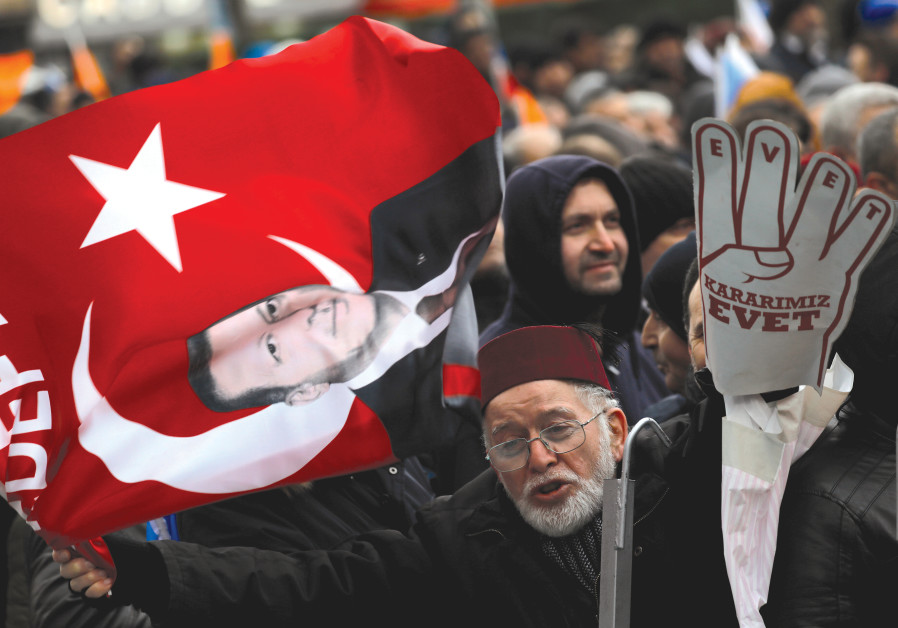Turkey also has disputes with Cyprus over airspace and natural gas drilling operations.
Seth J. Frantzman
Turkey’s increasing military role in Syria and Iraq is in the spotlight after the country’s forces exchanged fire with the Syrian regime and carried out an airstrike that killed civilians in northern Iraq over the weekend.
Turkey sees both northern Syria and northern Iraq as vital to its national security, especially what it views as threats from the Kurdistan Workers Party (PKK). Turkey’s Ministry of Defense said on June 28 that one of its observation points in northern Syria came under fire from the Syrian regime. Ankara said one of its soldiers was killed and several wounded. Turkish forces in Syria responded.
The incident took place in Idlib where Turkey has set up observation points over the last several years. In September 2018 Turkey and Russia agreed to a ceasefire that was supposed to see extremist groups removed from part of Idlib and prevent the Syrian regime from attacking the area. Turkey has increased its role in northern Syria since it launched Operation Euphrates Shield in 2016. In January 2018 it attacked the area of Afrin which was held by the Kurdish People’s Protection Units (YPG), which Ankara accuses of links to the PKK. Then Ankara increased its role in Idlib.
Turkey’s role in northern Syria is multi-pronged. It aims to prevent more refugees from fleeing Syria into Turkey. It also aims to stop the YPG from expanding. However, since Turkey has become closer allies with Russia, and is purchasing Russia’s S-400 air defense system, Turkey must be wary of clashes with the Syrian regime. Russia backs the Syrian regime.
Turkey’s close connection with Russia was on display at the G20 meeting in Osaka where Turkey’s President Recep Tayyip Erdogan met Russia’s President Vladimir Putin. In northern Syria tensions are boiling over. In Idlib various groups, some of them tied to Turkey and other tied to more extremist groups, have launched attacks on Syrian forces and also on Russia’s airbase in Latakia, using drones. In response Syria and Russia have pummeled some Syrian rebel-held areas in Idlib. US President Donald Trump has called for a halt in the violence.
In Northern Iraq Turkey has also expanded its military presence in what it calls Operation Claw. It says that in the last weeks 60 PKK members were killed in airstrikes and battles, with a total of 112 PKK fighters killed since May 27, according to Turkey’s Anadolu. On Thursday the Kurdish network Kurdistan24 reported that Turkish airstrikes killed four civilians. According to the report two cars were hit and three members of the same family, a father and two children, were killed. This is the kind of incident that had it been Israel would result in major headlines but because it happened in northern Iraq it went almost unnoticed outside the region. Yet Al-Monitor reports that Turkey is mulling a permanent presence in northern Iraq.
Even though these simmering conflicts go partly unnoticed until they boil over, they point to increasing challenges for Ankara. Turkey has inserted itself in an unprecedented way into both Syria and Iraq. In Iraq its presence dates from the 1990s and Turkey has historically sought to prevent this kind of escalation through agreements. In 1988 for instance Turkey and Syria signed the Adana agreement which was supposed to stop Syria from hosting the PKK.
Turkey is also trying to get the US to agree to a 20 mile “safe zone” in eastern Syria. It has been working with James Jeffrey, the US special representative for Syria, to try to get the US to move the Syrian Democratic Forces, of which the YPG is a component, away from the border. Recent reports in Turkish and other media, such as Ahval, have asserted that the US believes something is pending in eastern Syria. Trump said the US would withdraw in December, but so far the US presence has remained, although it is apparently being slightly reduced. Now Ahval reports that some countries, apparently in Europe, would “backfill” as US troops withdrew or created this “safe zone” along the border with Turkey.
Russia is now the key powerbroker for Turkey’s presence in northwest Syria. But evidence also points to Turkey laying the groundwork to remain for years. This includes the extension of different services, such as hospitals and college education for Syrians. Turkish law enforcement is also involved.
As if that wasn’t enough for Turkey, there are also rising disputes with Cyprus. Cyprus has complained to the UN about Turkish violations of air space, ports and other disputes. Turkey wants to drill in areas near Northern Cyprus, which Cyprus does not accept. Reports indicate Cyprus may carry out a naval exercise in an area where Turkey wants to drill for natural gas.
Turkey wants to balance all these simmering problems, hoping none become a crises. However Ankara does not want to be seen as stepping back in any area. That means it is also testing US threats regarding the S-400. The US has said the Turkey would not receive the F-35 and would be removed from the program if it takes the Russian air defense. Turkey says it wants it all; F-35s, S-400s, and a role in Iraq, Syria and in waters near Cyprus. This is a lot to juggle for a country that also has economic challenges and is increasingly caught between the agendas of Russia, Iran, the US and other countries.
Content retrieved from: https://www.jpost.com/Middle-East/In-Iraq-and-Syria-Turkey-faces-new-challenges-594100.
